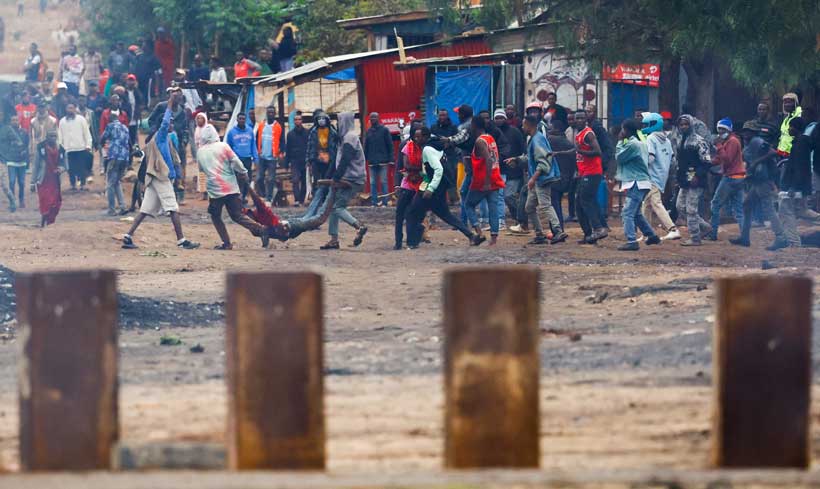Political Landscape & Key Contenders
Tanzania’s ruling Party of the Revolution (CCM) has dominated the country’s politics ever since its independence over 60 years ago. Incumbent President Samia Suluhu Hassan, Africa’s first female head of state, is widely expected to cruise to victory on October 29th.
In January 2025 CCM confirmed Hassan as its presidential candidate. In practice, the race is uncompetitive: Hassan’s two main competitors have been barred from standing. Tundu Lissu, charismatic opposition leader and 2015/2020 candidate of the opposition Chadema party, as well as Luhaga Mpina of ACT-Wazalendo, were both disqualified. With Hassan all but certain to win, 16 minor-party candidates who barely campaigned will fill the remainder of the ballot.
Vice-President under the late John Magufuli, Hassan reversed some of his hardline measures early on, by reopening political space and rejoining international vaccine efforts. She focused on completing mega infrastructure projects (such as roads, railways, and power) and has generally been credited with steady economic growth. Even with this, what remains undeniable is that her administration has returned Tanzania to an authoritarian style of government later in her term.
The Election Campaign Environment & Democratic Integrity
The campaign season took place under very tight restrictions and accusations of bias, with Chadema and ACT-Wazalendo effectively excluded, CCM ran largely unopposed nationally. State authorities reportedly attacked critics and journalists, by giving pro-CCM coverage nearly 24/7 while enforcing regulations to silence dissent.
For example, internet and social media were also tightly controlled: in the week before the vote Tanzania effectively banned “X” (formerly Twitter) for ordinary users, and on election day a nationwide internet blackout was reported.
For many Tanzanians and international observervers the process couldn’t be seen as anything but undemocratic. State security forces were omnipresent at rallies and polling stations; any public protests were swiftly banned. When small crowds gathered outside campaign events they were dispersed with force, and police warned that posting “inciting” political content online could lead to arrest.
Key Challenges and Threats
The election day triggered unrest in several major cities. Hundreds of young protesters took to the streets sometimes clashing violently with police. In Dar es Salaam and Mwanza demonstrators set buses and police posts on fire and security forces responded with tear gas and gunfire. Human-rights monitors reported that at least five civilians were killed (with some reports saying up to ten).
With dozens of unexplained disappearances of opposition figures and journalists in recent years, Hassan’s administration ordered an investigation into alleged abductions last year, but no official results were released. Prominent Chadema members remain on trial for “treason,” and several smaller opposition candidates were arrested in the final days just before the election. Combining these practices with the low turnout in urban areas especially among youth, suggests further loss of faith in the Tanzanian political system. All together, these threats mean that even a smooth tally would not resolve underlying tensions.
Regional & International Outlook
Regional bodies, such as observers from the African Union, the East African Community (EAC), and the Southern African Development Community (SADC) were present during the vote. The AU dispatched a 72-member mission led by former Botswana President Masisi and Nigeria’s ex-foreign minister Onyeama. In practice these delegations will issue preliminary statements after the vote and full reports in the coming weeks.
However, international reactions have been mixed. Most western observers have voiced sharp criticism: a statement by European Parliament members called Tanzania’s election “neither free nor fair,” and urged its global partners to defend democracy. While the U.S. and EU members’ embassies had previously expressed concern about the campaign environment, neither imposed sanctions.
By contrast, major developing powers have maintained a low profile. China and Russia, both deeply engaged economically in Tanzanian infrastructure and mining projects, have largely stuck to their policy of non-interference.
Signing a $1.4 billion deal with China for railway work and a $1.2 billion uranium mining agreement with a Russian firm this year, neither Beijing nor Moscow publicly commented on the vote, focusing instead on stable relations and continued investment. African neighbors similarly avoided direct criticism; the emphasis has been on observing procedure rather than questioning the outcome.
Future Scenarios & Implications
In the short term, this will bring continuity of policy: infrastructure projects under construction can proceed, and Tanzania’s economy, is likely to keep growing moderately, especially by investment from China and Russia, which see Tanzania as a strategic hub.. By sidelining credible opposition, the government sacrifices long-term political accountability and invites heavier criticism from human-rights NGOs.
Meanwhile, some youth activists have threatened further protests, declaring that Tanzanians are shifting into active citizens. Should street violence or international pressure grow, the election’s aftermath will set the tone for Tanzania’s next chapter. A smoothly managed outcome could cement CCM rule for years, but if the polls are viewed as a coerced victory it may instead erode trust in government and fuel future crises. Tanzania’s 2025 election shows how fragile stability without competition is. Unless the political space reopens, the country risks trading short-term order for long-term disillusionment.
